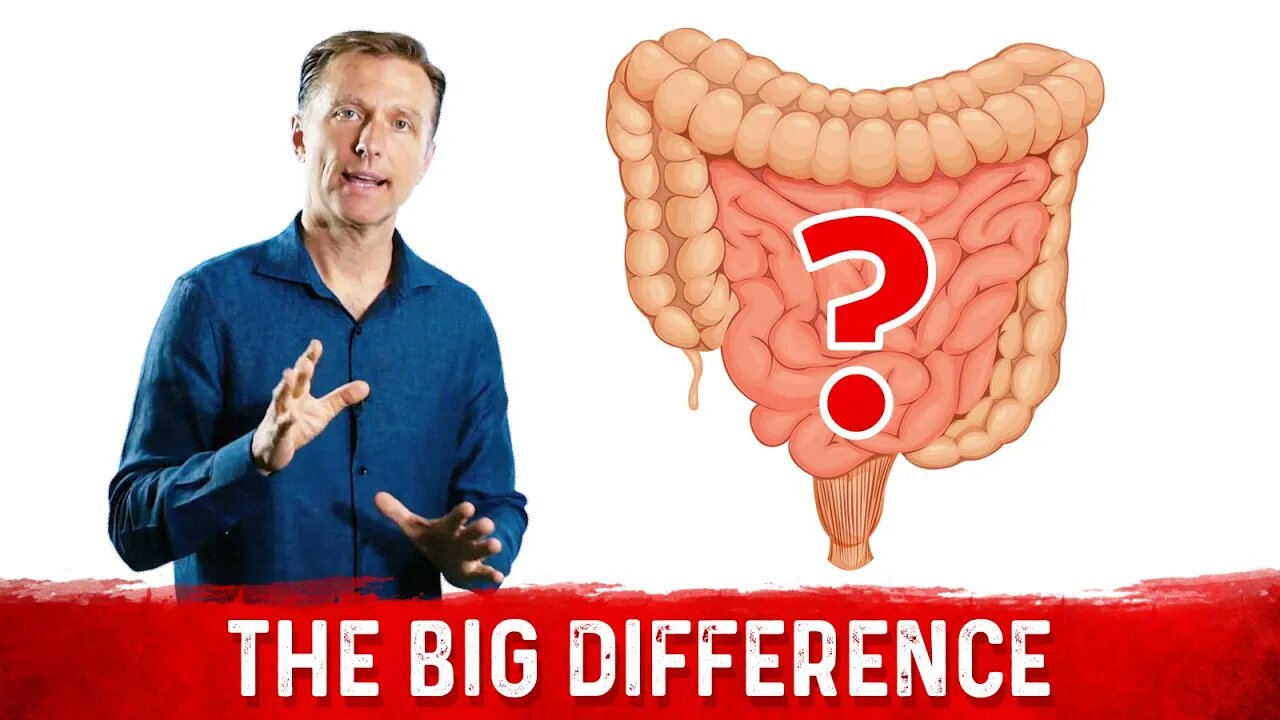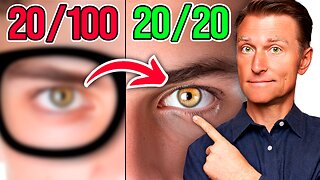Premium Only Content

The Difference Between the Colon and Intestines
Do you know the difference between the small and large intestines? Find out.
Learn More at drberg.com: http://bit.ly/36iC5lI
SIBO:
https://www.youtube.com/watch?v=fOIjbB27enE
Timestamps
0:06 The small intestine
2:51 The large intestine
In this video, we’re going to talk about the unique difference between the small intestine and the large intestines.
The small intestine:
The small intestine is a lot longer. There are three parts:
• The first part is 10-15 inches
• The second part is about 8 ft.
• The last part is 8-13 ft.
90% of all the digestion occurs in the small intestine. You have enzymes that are generated from the pancreas and the small intestine that help break down proteins, carbohydrates, and fat.
In the first part of the small intestine, you have the contents of the stomach and some of the juices from the pancreas coming out to help neutralize the acid from the stomach. You also have the absorption of iron happening here.
The next part of the small intestine is where you will absorb certain vitamins and nutrients.
In the last part of the small intestine, you will absorb and recycle bile salts. You’re also going to absorb vitamin B12, fat, fat-soluble vitamins, and certain electrolytes.
The small intestine is alkaline, which triggers certain enzymes.
When the microbes from the large intestine back up and get into the small intestine, that’s called SIBO. SIBO can cause nutritional deficiencies and a lot of bloating.
The large intestine:
The large intestine is a bit smaller at around 5 ft.
This is where fiber starts to ferment.
You’re also going to absorb water, fluids, certain electrolytes, salts, and potassium.
There are a lot more bacteria in the large intestine than in the small intestine.
The pH of the colon is going to be more acidic to help kill pathogens that should not be there. But, it doesn’t affect good bacteria.
When the fiber is fermented, it’s going to turn into small chain fatty acids, such as butyrate. Butyrate is actually the preferred fuel for the colon cells. Butyrate also helps stabilize your blood sugars, increase energy, and helps improve insulin resistance.
Talk to a Product Advisor to find the best product for you!
Call 1-540-299-1556 with your questions about Dr. Berg's products. Product Advisors are available Monday through Friday 8am-6pm and Saturday 9am-5pm EST.
* At this time, we no longer offer Keto Consulting and our Product Advisors will only be advising on which product is best for you and advise on how to take them.
Dr. Eric Berg DC Bio:
Dr. Berg, 56 years of age is a chiropractor who specializes in Healthy Ketosis & Intermittent Fasting. He is the author of The New Body Type Guide and other books published by KB Publishing. He has taught students nutrition as an adjunct professor at Howard University. He no longer practices, but focuses on health education through social media.
Follow us on FACEBOOK: fb.me/DrEricBerg
Send a Message to his team: m.me/DrEricBerg
ABOUT DR. BERG: http://bit.ly/2tAOAvE
Disclaimer:
Dr. Eric Berg received his Doctor of Chiropractic degree from Palmer College of Chiropractic in 1988. His use of “doctor” or “Dr.” in relation to himself solely refers to that degree. Dr. Berg is a licensed chiropractor in Virginia, California, and Louisiana, but he no longer practices chiropractic in any state and does not see patients so he can focus on educating people as a full time activity, yet he maintains an active license. This video is for general informational purposes only. It should not be used to self-diagnose and it is not a substitute for a medical exam, cure, treatment, diagnosis, and prescription or recommendation. It does not create a doctor-patient relationship between Dr. Berg and you. You should not make any change in your health regimen or diet before first consulting a physician and obtaining a medical exam, diagnosis, and recommendation. Always seek the advice of a physician or other qualified health provider with any questions you may have regarding a medical condition.
I hope this video helps you better understand the difference between the small and large intestines. Thanks for watching!
-
 19:57
19:57
Dr. Eric Berg
1 day agoHow to Reverse POOR Eyesight (Especially Over 50!)
5.26K14 -
 DVR
DVR
JuicyJohns
6 hours ago $0.21 earned🟢#1 REBIRTH PLAYER 10.2+ KD🟢
6.19K -
 45:33
45:33
The White House
4 hours agoPress Secretary Karoline Leavitt Briefs Members of the Media, Sep. 22, 2025
19.1K16 -
 1:05:07
1:05:07
Timcast
3 hours agoTrump Orders DOJ Bondi To Prosecute Democrats In Public Statement
175K101 -
 2:15:20
2:15:20
Steven Crowder
5 hours agoCharlie Kirk Conspiracies Spread Like Wildfire: What's Really Going On?
561K661 -
 DVR
DVR
Nerdrotic
7 hours ago $1.63 earnedStar Wars: Mandalorian and Grogu Trailer Reaction - Nerdrotic Nooner 518
37.6K1 -
 1:09:04
1:09:04
Rebel News
2 hours agoOstrich cull imminent, Rebel on the ground | Rebel Roundup
22.2K14 -
 1:04:57
1:04:57
The Rubin Report
4 hours agoCrowd Stunned by Trump’s Brutally Honest Remark at Charlie Kirk’s Funeral
79.1K49 -
 1:00:19
1:00:19
Grant Stinchfield
3 hours ago $1.64 earnedThe Exploitation of Charlie Kirk's Death is Very Real
20.3K26 -
 1:40:13
1:40:13
Nikko Ortiz
4 hours agoJapan's Prison System Is CRAZY...
40.6K3